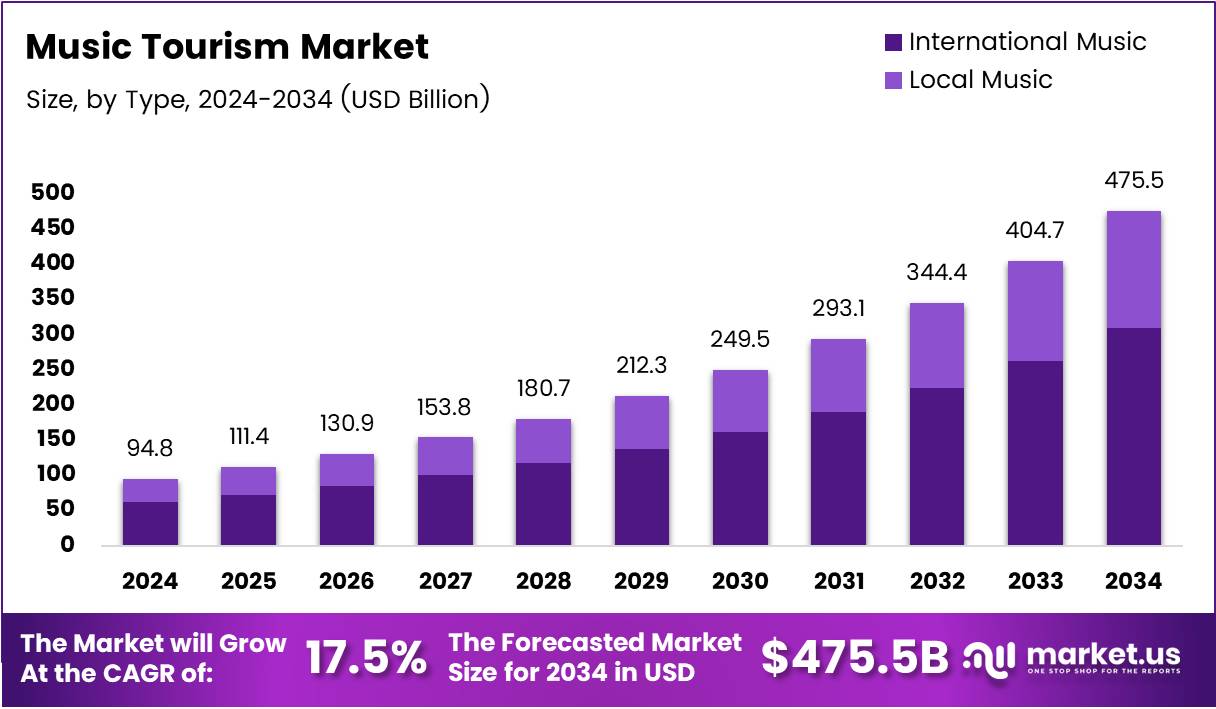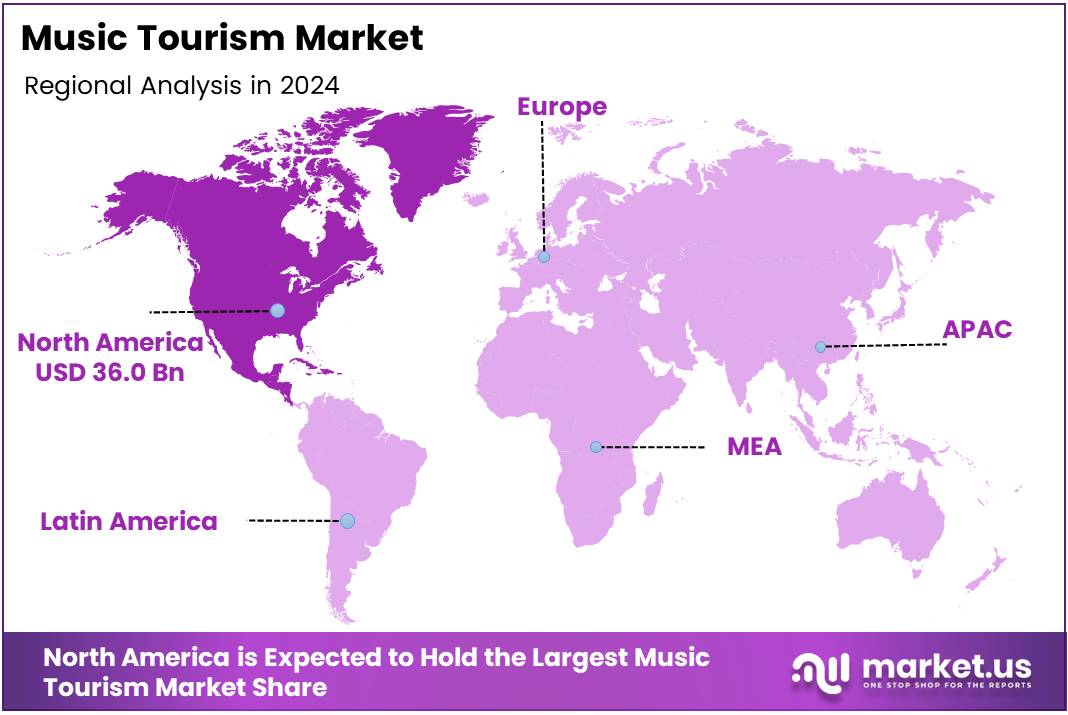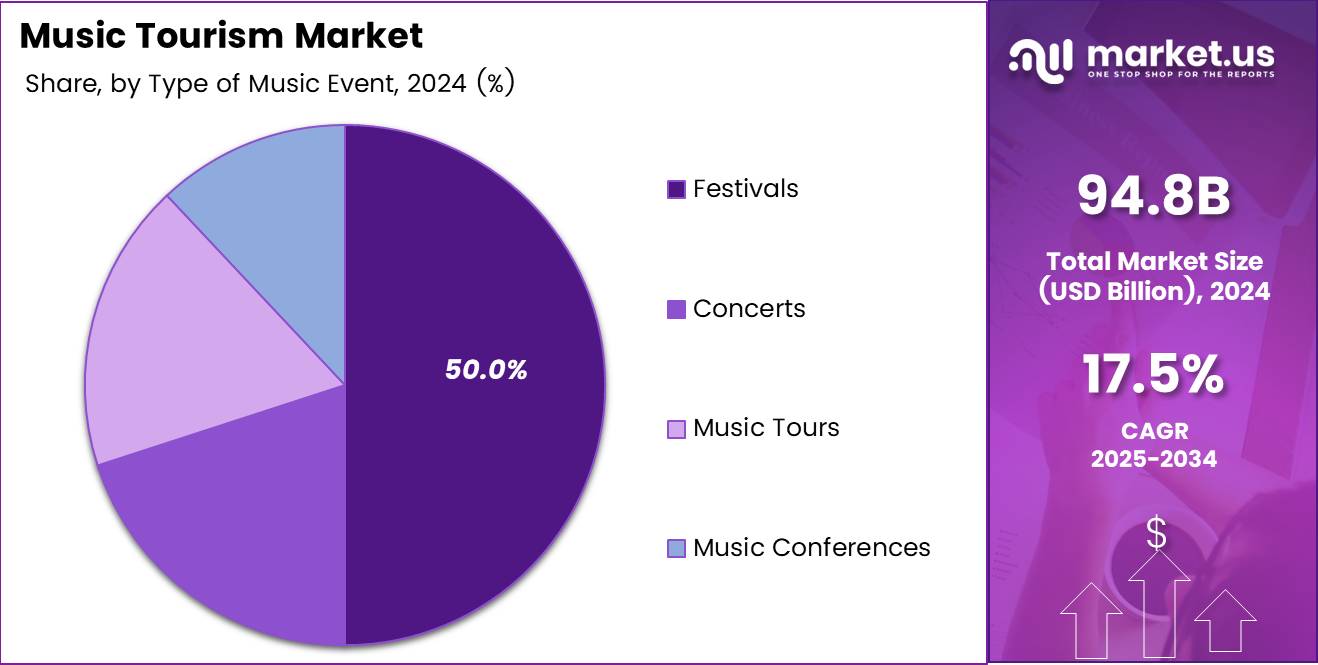Global Music Tourism Market Size, Share, Growth Analysis By Type (Local Music, International Music), By Type of Music Event (Festivals, Concerts, Music Tours, Music Conferences), By Region and Companies - Industry Segment Outlook, Market Assessment, Competition Scenario, Statistics, Trends and Forecast 2024-2033
- Published date: Dec 2024
- Report ID: 136063
- Number of Pages: 227
- Format:
-
keyboard_arrow_up
Quick Navigation
Report Overview
The Global Music Tourism Market size is expected to be worth around USD 475.5 Billion by 2034, from USD 94.8 Billion in 2024, growing at a CAGR of 17.5% during the forecast period from 2025 to 2034.
Music tourism involves traveling to attend live music events, festivals, or visit music-related attractions. It combines a passion for music with tourism, allowing enthusiasts to experience performances by favorite artists, explore music history sites, and participate in music-themed activities. Music tourism fosters cultural exchange and provides enjoyable experiences for music lovers.
The music tourism market includes businesses that organize and promote music-related travel experiences. This encompasses event organizers, festival promoters, tour operators, and hospitality providers catering to music tourists. The market focuses on creating packages that integrate live performances, accommodations, and travel arrangements, attracting music fans to various destinations and events.

Music tourism involves attending live events, festivals, and venues, blending travel with music experiences. In the United States, over 800 music festivals occur annually, catering to various tastes. Notably, 54% of American adults have attended at least one festival. Globally, events like Donauinselfest host 1.2 million attendees, showcasing music’s broad appeal.
Government initiatives significantly influence music tourism growth. The American Music Tourism Act of 2024 aims to promote U.S. musical heritage to boost domestic and international travel. Meanwhile, New South Wales invested $45.4 million in live music infrastructure, enhancing audience engagement and reinforcing the live music ecosystem as a major economic driver.
Music tourism has a notable economic impact on local communities. For instance, the Outback Trail music festival in Queensland generated over $750,000 for the local economy in 2024. Additionally, global festivals like the Montreal Jazz Festival draw 2 million visitors, further highlighting music’s ability to attract international audiences and drive spending across sectors.
Moreover, opportunities for growth in music tourism remain strong due to rising global demand. As music festivals attract millions, investments in infrastructure and marketing create a competitive but dynamic market. With increasing attendance and government support, music tourism continues to impact local economies and the global entertainment landscape positively.
Key Findings
- The Music Tourism Market was valued at USD 94.8 Billion in 2024, and is expected to reach USD 475.5 Billion by 2034, with a CAGR of 17.5%.
- In 2023, International Music dominates the type segment with 65.0% due to its global appeal and diverse audience reach.
- In 2023, Festivals lead the type of music event segment with 50.0% due to their ability to offer diverse line-ups and extended entertainment value.
- In 2023, International Destinations lead the destination type segment with 70.0% owing to diverse offerings and the allure of exotic locations.
- In 2023, Online Travel Agencies (OTAs) dominate the booking channel segment with 65.0% due to convenience and the ability to compare options easily.
- In 2023, North America dominates the regional market with 34.6% owing to its rich music heritage and a wide array of music festivals and concerts.
Business Environment Analysis
The music tourism market shows moderate saturation but continues to grow due to rising global demand for live events. According to the UK Music Report, 14.4 million music tourists attended live events in the UK in 2022, contributing £6.6 billion to the economy and supporting 56,000 jobs.
Young adults, particularly those aged 18 to 34, dominate this sector, accounting for over 60% of music tourists. According to the same report, this demographic displays a nearly equal gender distribution, reflecting the diverse appeal of music tourism across different audience groups.
Differentiation is crucial as events increasingly offer unique experiences. For instance, festivals combine music with cultural, culinary tourism, and adventure elements to attract a broad audience. Organizers aim to create immersive experiences that encourage repeat attendance and foster loyalty among music enthusiasts.
The value chain in music tourism integrates event organizers, local businesses, and transportation providers. According to industry insights, collaboration among these players ensures smoother logistics, enhances visitor satisfaction, and drives economic benefits for hosting regions, particularly in underserved localities.
Investment opportunities in this market are significant. Governments and private sectors are funding live music infrastructure to boost tourism. For example, New South Wales committed $45.4 million in 2024 to support live music, showcasing the potential for regional economic development through music-related activities.
Export-import dynamics are visible in the flow of international visitors. The UK attracted 1.1 million foreign music tourists in 2022, reflecting the appeal of its live music events. This highlights the growing opportunity for countries to promote cultural exports through music tourism, increasing cross-border visitor spending.
Adjacent markets, such as cultural tourism and luxury travel, complement music tourism’s growth. For example, travelers attending global events like Donauinselfest in Vienna, with 1.2 million attendees, often explore nearby attractions, boosting regional tourism. This synergy benefits the broader travel and entertainment industries.
Regional Analysis
North America Dominates the Music Tourism Market
North America holds a 38.0% share of the Music Tourism Market, driven by its rich music heritage and a wide array of music festivals and concerts across genres. This region benefits significantly from iconic music cities like Nashville, New Orleans, and Las Vegas, which draw visitors from around the globe.
Key factors enhancing North America’s dominance include diverse musical offerings from rock, jazz, to electronic music, and the presence of major music festivals like Coachella and Lollapalooza. Additionally, well-established venues and a vibrant live music scene contribute to the region’s high market share.
The regional dynamics are influenced by the integration of music events with local culture and tourism infrastructure, providing a holistic experience that spans beyond just music. This not only enhances visitor numbers but also increases their stay duration and spending.
The future influence of North America in the Music Tourism Market looks robust. The ongoing innovation in music event production and marketing, combined with growing interest in musical heritage and the rise of music streaming, which fuels concert attendance, are likely to boost the region’s market presence further.

Regional Mentions:
- Europe: Europe is known for its historical music scenes and hosts numerous world-renowned music festivals, drawing global audiences to destinations like Glastonbury and Tomorrowland, thus maintaining a strong market position.
- Asia Pacific: Rapidly expanding, Asia Pacific benefits from rising international and domestic interest in regional music festivals and a growing middle class with disposable income for travel and entertainment.
- Middle East & Africa: This region is emerging in music tourism, capitalizing on rich local music traditions and growing investments in large-scale music events and festival tourism to attract international visitors.
- Latin America: Known for its vibrant music and culture, Latin America is enhancing its visibility in music tourism through festivals and concerts that showcase its unique cultural heritage and lively music scene.
Type Analysis
International Music dominates with 65% due to its global appeal and diverse audience reach.
The Music Tourism Market can be segmented by the type of music which includes Local Music and International Music. International Music holds the larger share, accounting for about 65% of the market.
This dominance is attributed to the universal appeal of international artists and bands, which attract large crowds across different demographics and geographies. Major cities around the world host international music tours and events, drawing fans from various countries, thereby significantly boosting tourism revenue.
Local Music, while smaller in market share, plays a crucial role in attracting tourists who are interested in authentic cultural experiences. This segment promotes regional artists and showcases traditional music styles, which are important for preserving cultural heritage and attracting niche tourists.
Type of Music Event Analysis
Festivals lead with 50% due to their ability to offer diverse line-ups and extended entertainment value.
In the segmentation by Type of Music Event, the options include Festivals, Concerts, Music Tours, and Music Conferences. Music Festivals are currently the most dominant, capturing about 50% of the segment. Their popularity stems from the ability to experience multiple acts in one venue, often over several days, which offers considerable entertainment value and draws large crowds.
Festivals like Glastonbury, Coachella, and Tomorrowland have become global phenomena, contributing significantly to local economies.
Concerts are significant drivers of music tourism, appealing to fans who want to see their favorite artists live. This segment benefits local economies through direct expenditures on tickets, accommodations, and other amenities.
Music Tours involve following favorite bands or artists through different cities or countries and are especially popular among die-hard fans. This segment supports not only ticket sales but also airlines, hotels, and other tourism-related businesses.
Music Conferences, although smaller, play an essential role in the industry, providing networking opportunities for professionals and showcasing emerging talents which can drive future tourism.

Key Market Segments
By Type
- Local Music
- International Music
By Type of Music Event
- Festivals
- Concerts
- Music Tours
- Music Conferences
By Regions and Countries
- North America
- US
- Canada
- Europe
- Germany
- France
- The UK
- Spain
- Italy
- Rest of Europe
- Asia Pacific
- China
- Japan
- South Korea
- India
- Australia
- Rest of APAC
- Latin America
- Brazil
- Mexico
- Rest of Latin America
- Middle East & Africa
- South Africa
- Saudi Arabia
- UAE
- Rest of MEA
Driving Factors
Live Music Festivals Expansion Drives Market Growth
The Music Tourism Market is growing rapidly, thanks to several key factors. One major driver is the expansion of live music festivals around the world. These festivals attract thousands of visitors, boosting local economies and increasing demand for music-related travel.
Additionally, increased accessibility to music venues plays a significant role. Improved transportation and better connectivity make it easier for tourists to reach various destinations. Moreover, the growing middle class with disposable income means more people can afford to travel for music experiences.
Furthermore, enhanced marketing and promotion efforts by event organizers and tourism boards help attract a global audience. Effective use of digital marketing and social media campaigns raises awareness and excitement about music events.
As live music festivals continue to expand and become more diverse, they draw a wider range of tourists. Improved accessibility ensures that more people can participate, while the rising middle class fuels demand for premium experiences. Marketing efforts further amplify these trends, ensuring sustained growth in the market.
Restraining Factors
High Travel Costs and Accessibility Issues Restrain Growth
Despite its potential, the Music Tourism Market faces several challenges that hinder its progress. One significant restraint is the high travel costs associated with attending major music events. Expenses for flights, accommodation, and tickets can be prohibitive for many potential tourists, limiting the market’s reach.
Additionally, there is limited accessibility to remote music venues. Many popular music destinations are located in areas that are difficult to reach, deterring tourists from making the trip. Moreover, the seasonality of music events creates uneven demand throughout the year. Peak seasons see a surge in tourists, while off-peak times experience a decline, making it hard for businesses to maintain consistent revenue streams.
Furthermore, safety and security concerns in certain regions can dissuade travelers from visiting those areas for music events. Incidents of crime or political instability add to the apprehension, reducing the attractiveness of some destinations.
These restraining factors collectively pose significant obstacles to the growth of the Music Tourism Market. High costs limit the number of potential tourists, while accessibility issues restrict the range of viable destinations. Seasonal fluctuations make it challenging for businesses to plan and operate efficiently, and safety concerns can severely impact tourist confidence.
Growth Opportunities
Technological Integration and Niche Segments Provide Opportunities
The Music Tourism Market is brimming with opportunities driven by innovative trends and emerging demands. One key opportunity lies in the integration of technology in music experiences. Advancements such as virtual reality concerts and mobile apps enhance the tourist experience, making it more interactive and engaging.
Additionally, the development of niche music tourism segments offers specialized travel options for fans of specific genres or artists, catering to unique interests and increasing market appeal. Another promising avenue is the partnerships with local communities.
Collaborating with local businesses and artists can create authentic and immersive experiences, attracting tourists seeking genuine cultural interactions. Furthermore, the expansion into emerging markets presents significant growth potential.
Regions with rising incomes and increasing interest in music tourism offer new destinations for investment and development. These opportunities enable market players to diversify their offerings and tap into new customer bases.
Niche segments attract dedicated fan bases willing to spend on specialized experiences, while partnerships foster community support and sustainability. Expanding into emerging markets opens up untapped regions with high growth potential, allowing businesses to establish a strong presence early on.
Emerging Trends
Sustainability and Personalization Are Latest Trending Factors
Several trending factors are currently shaping the dynamics of the Music Tourism Market. Notably, the focus on sustainability is becoming increasingly important as tourists seek eco-friendly travel options. Music events are adopting green practices, such as reducing waste and promoting renewable energy, to attract environmentally conscious travelers.
Additionally, personalized music travel experiences are on the rise. Tourists are looking for customized packages that cater to their specific musical tastes and preferences, enhancing their overall experience. The fusion of music and cultural tourism is another significant trend.
Combining music events with cultural activities allows tourists to immerse themselves in the local culture, making their trips more enriching and memorable. Furthermore, the rise of virtual concerts complements physical music tourism by offering hybrid experiences that blend online and offline engagement.
Sustainable practices not only appeal to eco-conscious tourists but also contribute to the long-term viability of music events. Personalized experiences ensure that tourists feel valued and satisfied, leading to higher retention and positive word-of-mouth.
Competitive Landscape
In the dynamic Music Tourism Market, key players such as Live Nation Entertainment, AEG Presents, Eventbrite, and Ticketmaster Entertainment, Inc. stand out due to their significant influence and operational scope. These companies are pivotal in shaping the landscape of music events and festivals, directly impacting music-related travel.
Live Nation Entertainment is a global leader, known for producing and promoting a wide array of live music events. They not only host thousands of music concerts across the globe but also manage ticket sales, enhancing accessibility for music fans to experience live performances.
AEG Presents is another major player, operating numerous music festivals and live events that attract music tourists worldwide. Their well-known events like Coachella and Stagecoach are essential drivers of local and international music tourism, creating significant economic impacts in their host locations.
Eventbrite provides a platform for event management and ticketing that supports a vast range of music events, from small indie performances to large music festivals. Their technology-driven solutions facilitate event organization and attendance, playing a crucial role in the music tourism ecosystem.
Ticketmaster Entertainment, Inc., as part of Live Nation, is instrumental in the music tourism industry, offering a seamless ticket purchasing experience for a multitude of music events. Their global presence and innovative ticketing solutions ensure fans can easily access live music performances, thereby fostering music tourism.
These companies leverage their extensive networks, technological capabilities, and strong brand identities to dominate the Music Tourism Market. Their events not only promote cultural exchange but also significantly contribute to local economies through tourism-related revenues. As they continue to innovate and expand their offerings, their impact on the global music tourism scene is expected to grow, further cementing their leadership positions.
Major Companies in the Market
- Live Nation Entertainment
- AEG Presents
- Eventbrite
- Ticketmaster Entertainment, Inc.
- StubHub
- Vivid Seats
- Festicket
- Pollstar
- Songkick
- Bandsintown
- Glastonbury Festival
- C3 Presents
- Superstruct Entertainment
Recent Developments
- Vinyl Group: In December 2024, Vinyl Group, an Australian music tech company, acquired online travel guide Concrete Playground for $5 million. Concrete Playground, founded in 2009, has generated $4 million in revenue in the past year, offering digital guides for Brisbane, Sydney, and Melbourne.
- Concord: In September 2024, Concord Label Group announced the merger of Fantasy Records with Concord Records under the Concord Records brand. This consolidation, aimed at streamlining operations, strengthens the group’s position in the music industry.
Report Scope
Report Features Description Market Value (2024) USD 94.8 Billion Forecast Revenue (2034) USD 475.5 Billion CAGR (2025-2034) 17.5% Base Year for Estimation 2023 Historic Period 2019-2022 Forecast Period 2024-2033 Report Coverage Revenue Forecast, Market Dynamics, Competitive Landscape, Recent Developments Segments Covered By Type (Local Music, International Music), By Type of Music Event (Festivals, Concerts, Music Tours, Music Conferences) Regional Analysis North America – US, Canada; Europe – Germany, France, The UK, Spain, Italy, Rest of Europe; Asia Pacific – China, Japan, South Korea, India, Australia, Singapore, Rest of APAC; Latin America – Brazil, Mexico, Rest of Latin America; Middle East & Africa – South Africa, Saudi Arabia, UAE, Rest of MEA Competitive Landscape Live Nation Entertainment, AEG Presents, Eventbrite, Ticketmaster Entertainment, Inc., StubHub, Vivid Seats, Festicket, Pollstar, Songkick, Bandsintown, Glastonbury Festival, C3 Presents, Superstruct Entertainment Customization Scope Customization for segments, region/country-level will be provided. Moreover, additional customization can be done based on the requirements. Purchase Options We have three licenses to opt for: Single User License, Multi-User License (Up to 5 Users), Corporate Use License (Unlimited User and Printable PDF) 
-
-
- Live Nation Entertainment
- AEG Presents
- Eventbrite
- Ticketmaster Entertainment, Inc.
- StubHub
- Vivid Seats
- Festicket
- Pollstar
- Songkick
- Bandsintown
- Glastonbury Festival
- C3 Presents
- Superstruct Entertainment









